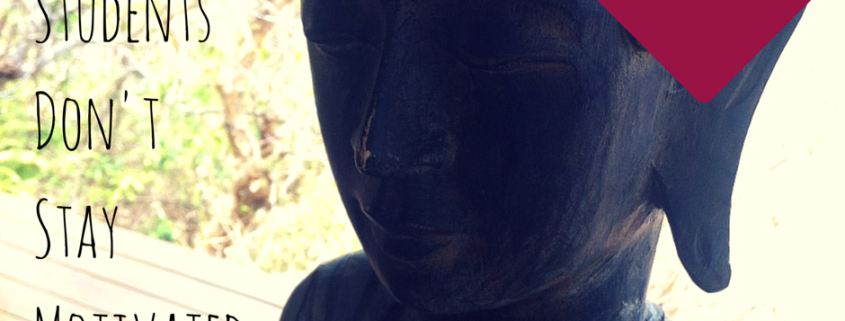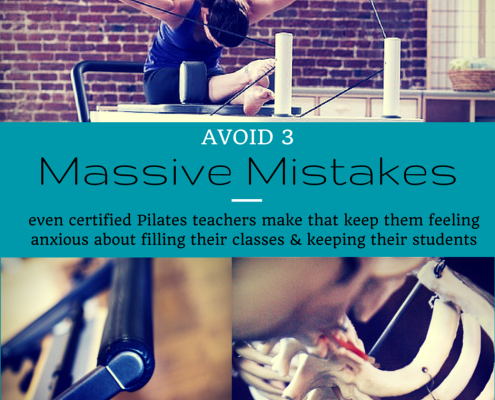Number One Reason Pilates Students Don’t Stay Motivated & What We Can Do About It TODAY!
Not The ONLY Reason Pilates Students Don’t Stay Motivated – The Most IMPORTANT One
There are a MILLION reasons we can lack motivation. Yet I am confident that we can address JUST ONE of these reasons – elevating it to the NUMBER ONE REASON WHY PILATES STUDENTS DON’T STAY MOTIVATED – and not only help our students feel more excited about practicing, showing up, progressing, and living a better life through Pilates, but increase our confidence and success as teachers long term.
Here is a list of the most common reasons for waining motivation:
- Lack of faith in one’s abilities.
- Fear of failure, due to failure in the past.
- Fear of what others might say.
- The habit of procrastination.
- Laziness.
- The feeling or belief that there are other more important things to do.
- Being too stressed or nervous.
- Absence of enough stimuli or incentives.
In more than 20 years of teaching what I have come to realize is that all of the reason above can be boiled down into ONE pivotal and powerful element – the kryptonite of sustained motivation: Unrealistic and/or Unacknowledged Expectations.
Unfortunately, this is a multi-faceted issue and can take some time and work to unravel and find ways of consciously applying it to ourselves and our students.
The good news, however, is that the more you can apply your understanding of unrealistic (set by you and/or your students) and unacknowledged (by you and/or your student) expectations the more effective you are as a teacher, the more fulfilled, successful, and MOTIVATED your students become, and the more empowered you are as a person attending to and reaching for your own goals.
The crux of the issue is twofold:
- We are not aware of the hidden expectations we have for ourselves and our students at the outset AND we do nothing or very little to unearth these unexplored expectations.
- We do not have nor do we use tools to set realistic expectations for ourselves and our students at the outset AND we do not track and correct course with regard to those expectations along the way.
The first challenge stems from the fact that expectations play a HUGE role in our lives and how we maneuver situations, set goals, and judge our progress. When we are operating under unacknowledged expectations (those set by the influence of others or by past situations and circumstances) we are constantly out of alignment with the reality of our situation and thus constantly:
- feel afraid of failing (not meeting the elusive expectation that no longer matches either what we truly want or what we can realistically attain);
- feel afraid of what others think of us;
- procrastinate (in order to avoid feelings of inadequacy);
- are lazy and lack incentive (lack of proof — lack of self-efficacy — that we can meet the expectation because we’ve not experienced enough success in the past);
- and feel nervous and stressed about not meeting others “perceived” expectations of us.
One of my favorite teachers, Phillip Moffitt, talks extensively about expectations and how they can control our life when we are not aware of them or their implications.
“Expectations show up in many forms – from what we expect of ourselves to what others expect of us and we expect of them. You may have high, low, or even negative expectations about what’s possible in your life. Just as an unrealistic high expectation can bring unnecessary disappointment, a low one can bring about underperformance or failure to see the opportunity in a situation.
A critical step in gaining clarity about expectations is learning to distinguish between them and possibilities. Expectations assume a certain result and are future oriented. They actually narrow your options, retard your imagination, and blind you to possibilities. They create pressure in your life and hold your present sense of well-being hostage to a future that may or may not happen. Expectations create rigidity in your life and cause you to react impulsively to any perceived threat to the future you believe you deserve.
When you are controlled by your expectations, you are living a contingent life and, therefore, aren’t free in the present moment.”
Unacknowledged Expectations
It’s like trying to steer a boat without a working navigation system or with a broken compass. How are we supposed to get where we want to go that way? We can’t and we don’t – that’s the bottom line and one of the primary reasons our students don’t stay motivated.
We’ve all had the experience of working with a student who comes in with tons of enthusiasm and a very dedicated plan for getting into their summer-time swimsuit, or improving their golf game. They have a specific goal. We know Pilates can definitely help. We are ready to go.
Things go well for the first 4-6 weeks (if that) and then all of the sudden the student starts to show up late, miss appointments, and make excuses (talking a lot during a session) for not working as hard or showing up less. What happened?
One or both of these things: The student showed up expecting that Pilates was going to immediately and dramatically change their body (the magic pill theory at work – a classic and common unacknowledged expectation) and make them look better in their swim suit and take off 5 strokes. They think that Pilates will be different from everything else they’ve done and when it proves to be just as much work, take as much dedication, they start to loose interest, feel like they’ve failed, and begin to wonder if they should be trying the Daily Method instead.
The second thing that might be happening is that we, too, believe that Pilates will change everything for them. In fact, we know it can. We’ve seen it. We’ve experienced it so we don’t take the appropriate steps to ensure that we have a viable, trackable, plan in place. Our unacknowledged expectation is that we SHOULD be able to get our student where he/she wants to go in the time they want to get there. We SHOULD be good enough to do that!!
Deep down though we also know that it takes time, consistency, and HARD WORK, and that the change they are hoping for doesn’t happen overnight. But we are not actually ACTING from this place. We are acting from the unacknowledged expectation that we SHOULD be able to give our student what they want even if it’s not realistic.
Unrealistic Expectations
And this brings us to the second half of the issue: Unrealistic expectations
Our students do this ALL the time. Out of a lack of understanding they think practicing Pilates 1 day a week is going to impart major changes in their body. The expect that in four weeks they will start to see weight loss, increased flexibility, less pain and seconds falling off their ride time or shots off their golf game. But what is the truth?
It boils down to two issues: One, that we don’t take time in the beginning and along the way to EDUCATE our students as to how Pilates works, what it does, and how it will help them achieve their goals. Teachers are often afraid of telling a new or potential student that Pilates will not, in fact, produce weight loss on its own, or that increased flexibility comes in part from changing movement patters which is a life long endeavor, or that the most profound results are achieved with frequent practice and integration into their lives. We want them to “believe” or have the “impression” that Pilates will do exactly what they want and we are the ones who can help them.
The second aspect of unrealistic expectations is that we don’t take time in the beginning and along the way to set and reevaluate expectations (our own and our students’). This is about having a consistent and effective strategy for setting short and long term goals and breaking them down into accessible, measurable, and specific actions that align with what the Pilates Method can do and with what we can do.
When we are aware of the power of unacknowledged and unrealistic expectations we open ourselves up to understanding the four key concepts that will lead us to cultivating and supporting greater, sustained motivation in our students.
- Intention: Setting a foundation for starting over (empathy)
- Core Commitments: Being versus doing (values)
- Discrepancy: Realistic assessment of progress (perception)
- Self-efficacy: Proof of success (experience)
This is SO EXCITING!
We can manifest real and lasting change in our students when we actively incorporate our understanding of how dangerous unacknowledged and unrealistic expectations can be AND employ strategies based on the four key concepts above.
What Are Intentions
(And How Are They Different From Goals?)
Intentions are HOW we can gracefully interact with challenge. They are HOW we can wisely interact with our goals. And they are HOW we can authentically engage with our lives.
Intentions infuse our goals, but are not goals themselves. Whereas goals are achievements we hope to accomplish in the future that require many steps, intentions are how we navigate each step, how we contend with not meeting the goals, and how we choose to experience the process of moving toward a goal.
Setting goals without first grounding ourselves and our students in an intention most assuredly ignores whatever unacknowledged expectations we might have and pretends that it is not necessary to constantly relate and re-relate to ourselves, our hopes, fears, and challenges throughout the process.
Intentions can be:
- to be patient,
- kind (to ourselves),
- persistent,
- open-minded,
- gentle,
- focused, or
- diligent
To name just a few.
So, how do we set intentions for ourselves and help our students do the same without getting too personal or too “spiritual”?
It’s actually pretty simple.
All we have to do is ask a few questions on your intake, or in your initial conversation with a new student, that will guide them toward the insight.
What we most want our students to become aware of is what’s thrown them off track before. What unacknowledged or unrealistic expectation has prevented them from reaching previous goals? Please remember that they might be VERY GOOD at reaching work or other types of goals, but not those related to their body. We want to get them to see what has kept them from their physical goals specifically.
Here are a few questions you can begin to ask:
- How do you think you might be pulled off track in reaching x goal?
- What are your top 2-3 excuses for not making time for exercise or for not being consistent with your home practice? (or other element)
- What are your expectations coming into this practice? (What do you expect of yourself? What do you expect of me?)
- Is there anything that makes you feel nervous about starting this practice?
- Do you have any fears coming into this practice?
- Do you expect that you will reach your goals? Why or why not?
Don’t ask all of these questions, just pick one or two that work for you or make up your own. The point is that we want our students to spend a little time getting clear and being honest with themselves about how they are showing up.
How do you arrive at the intention?
If you add an intention-based question into your intake then when you sit down with your student to review the intake you read their answer out loud, and reflect back to them how it applies to what you will be doing with them. For example:
Student’s answer: I know that not having enough time to spend with family and get my work done is a way that I will easily be pulled off track from my practice.
Your answer: Okay, so I see here that one of the ways you feel you are likely to be thrown off track is ‘not having enough time to spend with family and get my work done.’ I totally get that – I struggle with this one myself. What has been helpful to me in the past is to set a clear intention to be very fluid and flexible with my practice. What I try to do is make sure that I have made it to my two sessions per week NOT MATTER when they are – even if they are on two consecutive days and even if I have to keep my schedule fluid. No matter what I make sure I come twice a week. Does that sound like something that would be helpful to you? To keep your practice flexible and fluid? Let’s talk about how we can make that happen.
Deriving an intention from these questions might take a little practice, but if nothing else you can start doing it in your head for each and every student and for yourself. Then use the language with your student over and over again to help them anchor into HOW they are participating, reminding them that by being fluid and flexible – but accountable to 2x a week – they are staying on track and successful.
I promise you that although articulating intentions is subtle it will be IMMEDIATELY eye-opening and motivating for you and your students!
Okay, I want you to take this one nugget and see what you can do with it in the next week. Next Monday I will release the second article in this series on Core Commitments and how they play a crucial role in creating strong and sustainable MOTIVATION for our students.
I don’t think you’ll want to miss it!
Click the image below to add your name and email and receive article number two on Core Commitments as well as a special Four Part Video Course that I’m releasing next week called:



 How are you showing up? Why are you showing up? Why do you teach? What IS teaching? Why do you care? This is Skillful Teaching: A Whole-person approach to being an expert teacher, not an expert technician. There's a difference. Want to know what it is?
How are you showing up? Why are you showing up? Why do you teach? What IS teaching? Why do you care? This is Skillful Teaching: A Whole-person approach to being an expert teacher, not an expert technician. There's a difference. Want to know what it is?

Thanks Chantill, as always, for your great wisdom and eloquent delivery! It is so true that the expectations we knowingly or unknowingly set in the beginning with a client can set the stage for a successful or unsuccessful outcome. I’ve come to realize that it does no good to set expectations on myself for how a client will do because their openness, motivation and commitment will determine their success given my commitment to being 100% present and giving them my best teaching. I have no problem telling prospective clients that they must commit to two times a week to get good results. Those who have done that in my experience, have always seen huge benefits and stayed motivated to continue the journey with me.
Thanks for this article. It is so helpful I can see how I will immediately implement some of these ideas into my practice.
Warm Regards
Marcia